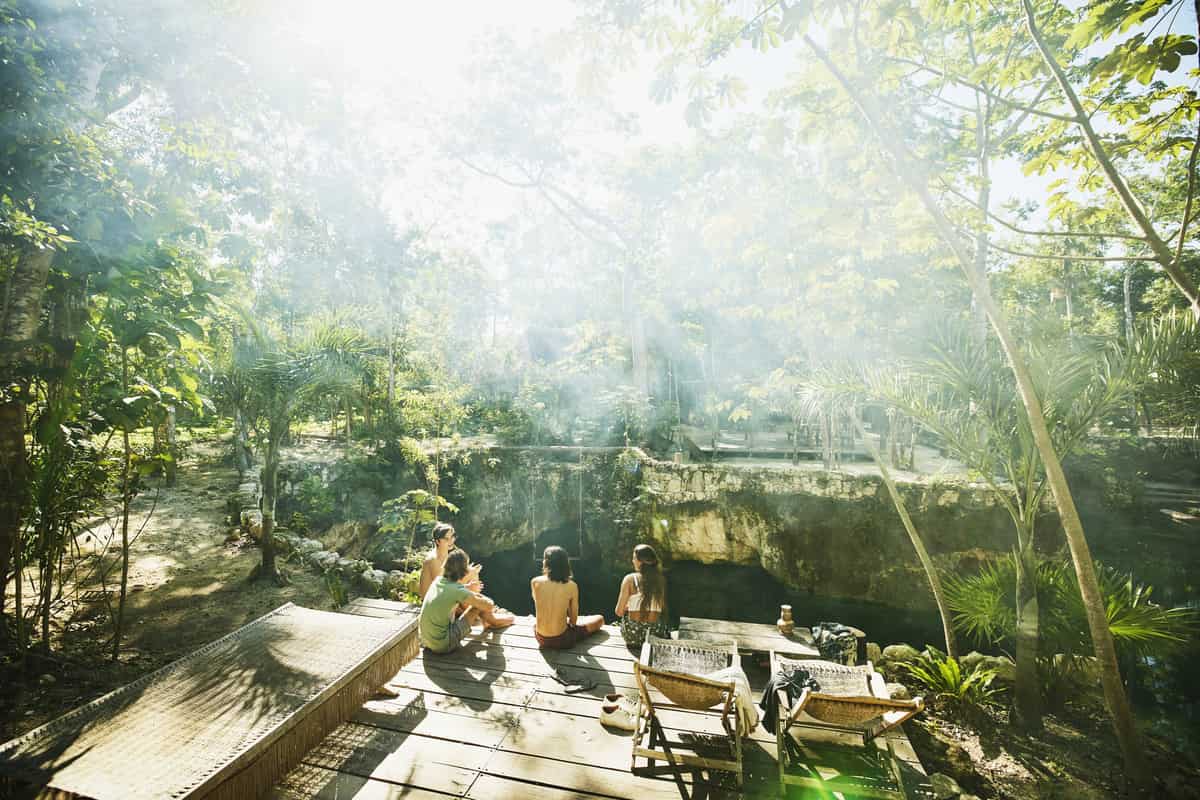Who wouldn’t be excited by the idea of working in a gorgeous natural setting, appreciating beauty while contributing positively to the environment? For those with an adventurous spirit and a green outlook, eco resorts provide a fantastic opportunity. Let’s take a look at some luxurious eco resorts around the globe where work can feel like vacation, examine their benefits and learn how to get jobs with them.
What is an eco resort?
Eco resorts or eco-lodges are a step forward in sustainable tourism and responsible travel. It’s more than a trendy buzzword and embodies the philosophy of environmental consciousness and care. An eco resort ensures minimal harm to the surrounding ecosystem without sacrificing comfort or luxury for guests.
These establishments aim to reduce food waste, conserve natural resources such as water and energy, promote local culture and protect wildlife habitats. Frequently located in natural environments such as rainforests, pristine beaches or tranquil mountain landscapes, eco resorts offer an immersive experience into nature while adopting environmentally friendly practices.
Benefits of working in an eco resort
Besides immersing oneself in glorious settings, there are plenty of perks when it comes to working in this sector. They include:
- Meaningful mission: when you work at an eco resort, you’re not just in a job, you’re contributing to promoting sustainable tourism. You have the satisfaction of knowing you are actively contributing to environmental protection and conserving precious resources. Alignment with a meaningful mission can bring personal fulfillment and professional satisfaction
- Environmental expertise: eco resorts often provide educational programs focused on conservation and sustainability. These offer valuable opportunities to develop skills and gain qualifications while deepening your understanding of environmental issues
- Cultural exchange: engaging in conversations with guests from diverse backgrounds promotes personal growth through cultural exchange. By interacting with travelers who are seeking meaningful experiences, you can forge connections and broaden your global perspective
- Power of nature for wellness: working in a nature-focused setting can provide a mental health boost. By embracing the tranquility of your surroundings and opportunities to make the most of them, you can reduce stress
Working in eco resorts can be an incredible experience that nurtures nature lovers and individuals seeking fulfilling careers outside traditional spheres.
Types of eco resorts
The commitment to providing luxury while preserving environmental integrity has given rise to an assortment of eco resorts. Among these, three popular types of hotels stand out: eco hotels, eco lodges and eco camps. Each offers a unique combination of hospitality and sustainable practices.
Eco hotels
Eco hotels redefine luxury with sustainable practices, offering desirable facilities while maintaining environmental integrity. Projects such as Kittitian Hill in St Kitts and Hawaii’s eco resorts blend opulence with ecotourism principles, providing employees with a chance to care for guests and conserve resources.
Eco lodges
Eco lodges seamlessly blend sustainability with charm, providing guests with nature-centric experiences in stunning surroundings. Examples such as Costa Rica’s Lapa Rios Lodge prioritize community and environmental impact. Employees in these lodges play vital roles, from assisting on organic farms to raising awareness about local biodiversity.
Eco camps
Eco camps offer immersive wilderness experiences with more modest comforts. From canvas tents in the Serengeti to yurts in the Canadian Rockies, these nature resorts create inviting camping environments for guests. Working here requires flexibility and curiosity, offering opportunities for exploration alongside employees’ regular responsibilities.
Skills needed to work in an eco resort
Securing a job at one of the best eco resorts in the world means having great hospitality skills. However, while these are key, they aren’t the only prerequisites. A deep understanding and commitment to sustainable practices also play a major role.
Environmental knowledge and awareness
Profound environmental knowledge is essential for working in eco resorts. Every action has an impact on local wildlife and the environment. Understanding concepts such as energy conservation and recycling is vital. This awareness aids interactions with guests who choose eco retreats, building trust through informed responses about issues such as food waste reduction and sustainability.
Leadership skills
Strong leadership is crucial. Roles in eco resorts often involve directing teams and coordinating ecology-focused activities. Having a strong focus on eco-friendly operations can help make sure that your resort continues to thrive, with none of the activities you offer being compromised by the degradation of the nearby environment. Things to consider including organizing nature walks, respecting native flora and initiating energy-saving initiatives.
Interpersonal skills
Just like with any other resort, interpersonal skills are important to help make sure that staff and guests are all comfortable and able to communicate well. On top of this, you have to have interpersonal skills in order to communicate well with the local cultures, which will help you create a memorable experience for all patrons.
Flexibility and adaptability
Unpredictable events in nature may mean adjusting schedules around weather or swiftly responding to seasonal changes, so you’ll need to be flexible and adaptable. It’s important to keep a level head and figure out how to work through issues. There are many techniques for doing this and many benefits of studying hospitality and tourism management to learn more about them.
Studying for a degree in hospitality can help you develop and build these skills, which will in turn open doors to the exciting world of eco resorts.
Discover the strategies that lead to success and learn to combine sustainable hospitality with delivering consistent excellence in customer experience.

Popular eco resorts around the world
If you’re looking for eco resorts that provide an opportunity to work while being involved in conservation efforts, a number of top hotel brands offer these kinds of locations globally. Below are some of the most renowned in the world.
Daintree Wilderness Lodge (Australia)
Located deep within the world’s oldest rainforest, Daintree Wilderness Lodge provides an authentic eco-retreat experience. Combining luxury and environmental consciousness, it caters to individuals who desire a harmonious connection with nature while ensuring exceptional guest service. With a strong commitment to nature conservation, this resort is an ideal destination for those passionate about protecting the environment.
EcoCamp Patagonia (Chile)
EcoCamp Patagonia features a unique collection of geodesic dome tents that draw inspiration from ancient nomadic designs. This eco-conscious gem offers stunning views of Torres del Paine National Park in the south of the country. If you’re drawn to adventure tourism and have a passion for preserving pristine environments, working at EcoCamp Patagonia would be both fulfilling and impactful.
Lapa Rios Lodge (Costa Rica)
One of the standout eco-friendly resorts in Costa Rica is the Lapa Rios Lodge. Nestled within a private nature reserve, it provides an immersive experience with tropical wildlife while prioritizing sustainable practices and community outreach programs to protect the rainforest and local biodiversity.
Feynan Ecolodge (Jordan)
Feynan Ecolodge offers a unique chance to immerse yourself in Middle Eastern history and culture. The lodge features beautifully lit rooms, powered by solar energy and adorned with candle light, providing an ultra-sustainable vacation experience. Notably, Feynan also plays a vital role in supporting the local Bedouin communities through employment opportunities, demonstrating its commitment to ethical tourism.
Campi ya Kanzi Eco Lodge (Kenya)
Located within a sprawling 280,000-acre Maasai-owned reserve in Kenya, Campi ya Kanzi seamlessly combines luxury and sustainability. Working at this green hotel is an opportunity to experience stunning African wilderness and provides an opportunity to experience the rich Maasai culture. By employing locals from indigenous communities, the lodge contributes to their welfare.
Three Camel Lodge (Mongolia)
Experience the breathtaking natural beauty of Mongolia’s wilderness while working at Three Camel Lodge. This eco-resort seamlessly blends traditional Mongolian architecture with modern comforts, providing a unique and sustainable hospitality experience. This resort contributes to preservation initiatives and development projects that benefit rural nomadic herders.
Phinda Forest Lodge (South Africa)
The enchanting Phinda Forest Lodge in South Africa is carefully integrated into the beautiful Sand Forest, providing exceptional guest experience while also contributing to the conservation of endangered species. Phinda Forest Lodge strives to set new standards in the luxury eco-resort sector.
Topas Ecolodge (Vietnam)
Nestled on a hilltop near Sapa, Vietnam, Topas Ecolodge offers awe-inspiring views of the valley below, with its picturesque terraced rice fields. Not only is Topas Ecolodge renowned for its stunning setting, it is also recognized as one of the top sustainable resorts worldwide thanks to its commitment to resource conservation and local job creation.
Hamanasi Adventure & Dive Resort (Belize)
Located on Belize’s beautiful Caribbean coastline, Hamanasi embraces ecological principles in its operations, ensuring a harmonious blend between man-made structures and natural surroundings. This commitment to eco-friendly design enhances the breathtaking beauty that visitors expect from Belize, while also ensuring that guests have all the amenities they need.
Best practices for working in an eco resort

Working in luxurious eco resorts introduces you to a range of best practices that enable conservation and profitability despite the challenges that you can face. Some things that need to be considered are:
Reduce waste and energy consumption
Minimizing waste and energy use is necessarily high on the agenda for eco resorts. Encouraging guests to reuse towels and use food scraps for compost or animal feed helps them eliminate waste. Meanwhile, renewable energy sources such as solar power and wind turbines reduce eco resorts’ reliance on traditional electricity.
Conserve water resources
A lot of resorts also have to prioritize water conservation without compromising guest comfort. Low-flush toilets, rainwater harvesting and greywater recycling systems where permitted all help maintain a resort’s eco-friendly values.
Promote sustainable agriculture and fishing practices
Advocate for locally sourced foods to reduce carbon footprint and support nearby communities. This includes encouraging responsible fishing methods to protect marine ecosystems and prevent overfishing.
Protect local wildlife and habitats
Safeguard surrounding biodiversity by minimizing disruptions during resort expansions and expeditions. Educate guests about local species to improve understanding and potentially contribute to conservation efforts.
How to find a job at an eco resort
Finding the ideal role at one of the best eco resorts in the world requires effective preparation and research. Below, we outline the steps you should take to secure your dream position.
Research potential employers online
When beginning your job search, it’s important to research the places where you want to work. Take the time to explore luxury eco resorts and sustainable options, getting a clear understanding of their mission, culture and available positions. You can use keywords such as ‘eco lodge’ and ‘all-inclusive eco resort’ to find relevant companies. Consider reading customer reviews and rankings to get a sense of their standards as well.
Network in the industry
Networking is crucial for expanding your opportunities. Make sure to attend events at eco-resorts, connect with professionals on LinkedIn and engage in environmental forums. Take the opportunity to discuss subjects such as popular eco resorts in your area of interest. Studying for a hospitality degree enables you to work and learn alongside industry experts and gives you a great opportunity to expand your network.
Gain the management skills needed to land coveted positions in environmentally conscious resorts through study and sought-after professional placements.

Craft a tailored resumé and cover letter
Target your resumé and cover letter towards positions in the eco-friendly industry. Emphasize pertinent experience such as volunteering at nature resorts or being an intern at ecotourist destinations. Highlight sought-after soft skills such as adaptability and leadership and showcase any sustainability initiatives you have been involved in.
Apply for open positions
To find job opportunities, consider applying through relevant platforms. Check out company websites and explore job portals that specialize in environment-oriented roles. Remember, an internship in hospitality could also lead to a permanent position. Keep in mind that if you’re interested in working at eco-friendly resorts in popular locations, it may require some patience.
Get a hotel management degree
Getting the right degree can help you become a more sought-after candidate for eco resort companies. Hospitality degree courses will allow you to learn about the industry and work in professional settings during internships.
Find out how to combine your passion for sustainability with expert strategies for success in the hospitality sector that can help you work anywhere in the world.

The pros and cons of working in an eco resort
Working in luxury eco resorts can be highly rewarding, but may pose some challenges too.
Advantages
- Harmonious connection with nature: away from metropolitan pressures, eco resorts can provide a tranquil ambiance as many are located in appealing natural settings
- Environmental education: on-the-job learning about sustainable practices enriches your environmental understanding
- Healthy lifestyle: adopting healthier routines is often easier in green environments. Natural food options and outdoor activities play a key role in promoting overall health for employees
- Less pressure: owing to the focus on sustainability, there may be less competition compared with traditional hotels, especially for certain roles such as eco-tourism guides or organic gardeners
Drawbacks
- Limited social interaction: since many eco retreats are intentionally secluded from densely populated areas, opportunities for socializing could be limited
- Hard physical work: jobs in these settings may involve considerable physical effort, especially if you’re tasked with maintaining trails or properties
- Modest wages: positions at smaller scale facilities may be less well remunerated than those with the big industry players
Deciding where you want to take your career requires a thoughtful approach and it’s worth weighing up these pros and cons carefully before choosing this path.
Conclusion
Embarking on a career path in hospitality means having lots of choices, particularly if you’re interested in eco tourism, where luxury hospitality meets environmental respect.
Working at eco resorts can offer life-enriching experiences that blend professional opportunities with the chance to enjoy some stunning locations. It offers a unique way to commit to upholding sustainability practices while delivering exceptional customer service. If you want to pursue this as a rewarding career, consider studying with a renowned hospitality school such as Les Roches.
Main Image:
Thomas Barwick/ DigitalVision Via Getty Images




